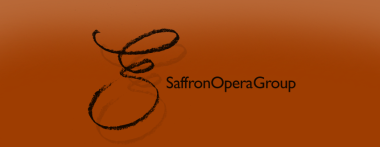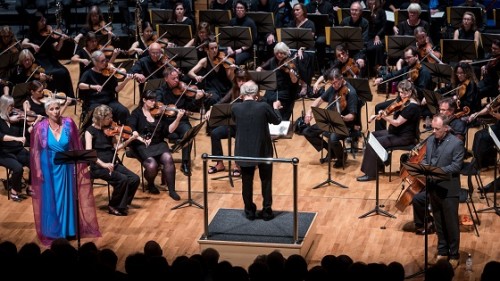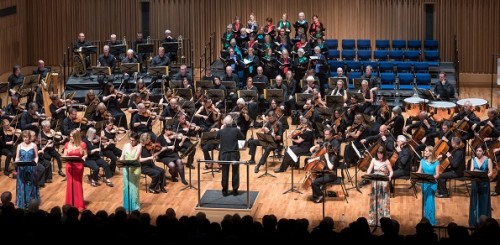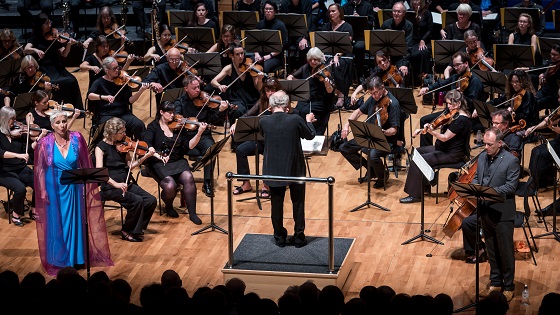
 United Kingdom Wagner, Parsifal (concert performance): Soloists, Saffron Opera Group Chorus and Orchestra / Michael Thorne (conductor). Saffron Hall, Saffron Walden, Essex, 16.9.2018. (JPr)
United Kingdom Wagner, Parsifal (concert performance): Soloists, Saffron Opera Group Chorus and Orchestra / Michael Thorne (conductor). Saffron Hall, Saffron Walden, Essex, 16.9.2018. (JPr)

& SOG Orchestra (c) Roger King
Cast:
Michael Bracegirdle – Parsifal
Elaine McKrill – Kundry
Andrew Greenan – Gurnemanz
Richard Burkhard – Amfortas
Nicholas Folwell – Klingsor
Richard Wiegold – Titurel
Grail knights – Brian Smith Walters & Louis Hurst
Esquires – Sharon Kempton, Melanie Lodge, Brian Smith Walters & Arthur Bruce
A Voice from Above – Jennifer Westwood
Flower maidens – Gail Pearson, Melanie Lodge, Hannah Mason, Sharon Kempton, Mari Wyn Williams & Jennifer Westwood
Some self-plagiarism is good for the soul, so I will remind readers of something I have written before and how my first experience of Parsifal in a concert version was at the Royal Albert Hall in 1999. I was teaching in Southend, Essex, and I left an after-school meeting with little time remaining to get there and arrived faster than I ever had before by car, in not much over one hour. I mention this because I was reminded about it when driving nearly 40 miles through the Essex countryside – in a surprisingly equally short time – from home to Saffron Walden having only just recovered from landing back in the UK after a week when I seemed to have walked all over the South of France … but that is story for some other time!
In 1999, despite evidence of more rehearsal time needed – it was the forces of the Kirov Opera under Valery Gergiev – the orchestra played well, the chorus sang out powerfully but some of the soloists spoilt the performance somewhat for me. Where have those years gone? Leapfrogging over Parsifals at the BBC Proms in 2000 and 2013 I have survived until 2018 to watch the opera in the functional setting of Saffron Hall and it is – as I have also written before – a case of plus ça change, plus c’est la même chose (‘the more it changes, the more it’s the same thing’). Though perhaps that is not entirely true because in 1999 it was the Kirov Opera, in 2000 Bernard Haitink and the Rotterdam Philharmonic, 2013 the Hallé and Sir Mark Elder, but now it was the Saffron Opera Group reaching for Wagnerian heights. Their achievement – and continual improvement – is a credit to all concerned. They began in 2013 and as their website (click here) notes they ‘cast soloists with existing national and international reputations together with promising young artists. They, and the Saffron Opera Group Orchestra, have established a growing reputation for high quality performances, particularly in Wagner’s Ring cycle, which we presented in 2016/17. The Saffron Opera Group Chorus is drawn largely from the many Choral Groups in the Saffron Walden/Cambridge area but is open to all competent singers.’
They have not only succeeded with the Ring, but they began(!) with Die Meistersinger von Nürnberg in 2014 and Tristan und Isolde will follow this Parsifal in 2019.
What did Wagner want us all to understand from his Parsifal? Any suggestions gratefully received. In a fascinating essay in the programme about Gurnemanz, Speight Jenkins – Seattle Opera’s former general director – mentions how the character ‘tells the young man [Parsifal] that in the temple “time becomes space”. Even in the twenty-first century it is hard to understand what Wagner meant, he never said’. Thoughts on Wagner’s final work veer from it being an eclectic mix of Christian symbolism, Buddhist philosophy and medieval myth, to being interpreted from a Freudian perspective, or even worse, considered to be a treatise on ‘racial cleansing’. Who is redeemed at the end of the work remains an intriguing puzzle as it could be almost any of the characters, especially if we accept it is all more Buddhist than Christian and they are all on the path from ignorance to enlightenment. Perhaps it is just that – towards the end of his life – it was Wagner himself who felt he should seek redemption?
Basically, it is the sacred spear that pierced Christ’s side and the Grail with his blood that are the relics the plot hinges on: brotherhood, chastity and sexual desire links the wise and respected Gurnemanz, the wounded king Amfortas, his enemy Klingsor, a femme fatale Kundry, and the naive Parsifal, each of whom have their own demons to conquer. With Wagner in concert the audience can concentrate more fully on the words (thanks especially to Saffron Opera Group’s good surtitling) and, of course, all the sublime music since they are spared the concern of being puzzled by the whims of the latest wunderkind stage director.

There is only a minimal sense of stage direction and interaction between singers with these SOG presentations and – to be honest – more thought could go into them. There is an informal formality to what everyone wears though Amfortas settled for rehearsal clothing. In Act II Kundry was considerably glammed up, the flower maidens wore brightly coloured frocks and the women of the chorus joined in by wearing an array of scarves in plain colours. These concerts would go much better if singers were not tied down to their scores on music stands in front of them, but that would require preparation time that – I suspect – those involved do not have at their disposal. When Michael Bracegirdle’s Parsifal, with one eye on the music in front of him, thrusts out an empty fist at the end of Act II as if holding an imaginary spear, there is the passing thought of what is – or where was – its point?
I would have liked to see more use made – if possible – of Saffron Hall as the ‘Grail Temple’. Perhaps the gallery above the orchestra is too restricted for even a small choir of 24 men and 24 women. However, the singing of James Davey’s well-coached Saffron Opera Group Chorus failed to create the spiritually transcendent atmosphere the Grail ceremonies require. The bells are something difficult to get right even in fully staged performances and the sound from an arrangement of bell plates was better than I have sometimes heard, however having to watch the valiant percussionist dealing with them was rather distracting.
The Saffron Opera Group Orchestra played as well as I have heard them and were as virtuosic with their final pages of the long opera as they were with the first ones. It is rare to hear faultless playing even from the world’s best orchestras so what issues there very occasionally were can be totally ignored. All the musicians showed great dedication to the task and there was a glorious sheen to the strings, warm supple woodwind, and suitably burnished clarion – if occasionally too prominent – brass.
Michael Thorne’s Wagner conducting style is nothing like the legendary Reginald Goodall or his adherent Anthony Negus, who was in the audience. He is all elbows and a seemingly rigid beat, nevertheless, he got an almost miraculous response from his orchestra in a flowing musical performance that revealed nearly every detail and nuance in Wagner’s score, dwelling upon it respectfully without compromising the impression that he had his own overarching grasp of structure. Thorne’s exemplary Parsifal never dragged and lasted only fractionally more than four hours.
Andrew Greenan is a stalwart SOG ‘veteran’ having sung Hans Sachs in their inaugural performance and subsequently Wotan and Wanderer. His is a grizzled and immensely authoritative Gurnemanz (one of four roles he has sung in the opera). The lower part of his bass-baritone voice is in fine shape but some of the higher lines of the music challenged him. He communicated the text well and had the ability to fill Saffron Hall with sound, as well as striving to embody the role of this Wagnerian elder.
Richard Burkhard’s Amfortas was the revelation of this performance. Thoroughly prepared his was an anguished and deeply moving performance that was thoughtfully sung with a compelling, resonant baritone voice. Nicholas Folwell was his usual impeccable self as a well-projected and malevolently evil Klingsor. Her ‘duet’ with Parsifal brought Elaine McKrill’s previously understated and anodyne Kundry to the fore as she, vocally, let rip with ‘Ich sah Ihn und lachte’ (‘I saw Him and laughed’). McKrill was then in impressive form through to the end of Act II and is a deserved favourite with the Saffron Hall audience. To her credit she stayed ‘in character’ – and on stage – throughout the opening to Act III when she could have simply retired to the dressing room after some moaning and groaning and two words, ‘Dienen, dienen’.
Brian Smith Walters and Louis Hurst were a good pair of knights, Richard Wiegold’s baleful utterances from the gallery as Titurel where mightily impressive and there was an excellent sextet of leading flower maidens. This leaves me with Michael Bracegirdle’s Parsifal that seemed underpowered in Acts I and III but was at his passioned best with his ‘Amfortas! Die Wunde! Die Wunde!’ in Act II. Together with Folwell’s Klingsor, McKrill’s Kundry, the flower maidens and the orchestral playing it all helped to make this the best single act I have seen and heard from Saffron Opera Group. Bracegirdle is not the finished article and his ‘Nur eine Waffe taugt’ (‘But one weapon serves’) at the very end of the opera – regardless of your own personal belief system – should really have been the summation of all that had gone before and add to the transcendence of the final moments … but it didn’t. So, despite the substantial efforts of Michael Thorne, his committed chorus and talented musicians the ending remained rather earthbound.
Jim Pritchard

From Fran Lambert (Saffron Opera Group),
Many thanks for this, in my view, accurate and very constructive review.
However, and for future reference, you should be aware that we have tried on more than one occasion to use the balcony at the back. Initially Stuart Pendred attempted the Nightwatchman in ‘Die Meistersinger’ from there and opined that it was well-nigh impossible to hear the orchestra. We also initially tried Hagen’s vassals from there and the same thing applied – we missed all the cues. In addition it was found that choral sound simply does not carry from there. It would appear that the Ferrari acoustics of Saffron Hall are just as fickle as the car – they are specifically designed to project sound from the performance space towards the audience and from and to nowhere else. So we are a bit restricted.
Many thanks for coming and on to ‘Tristan’!